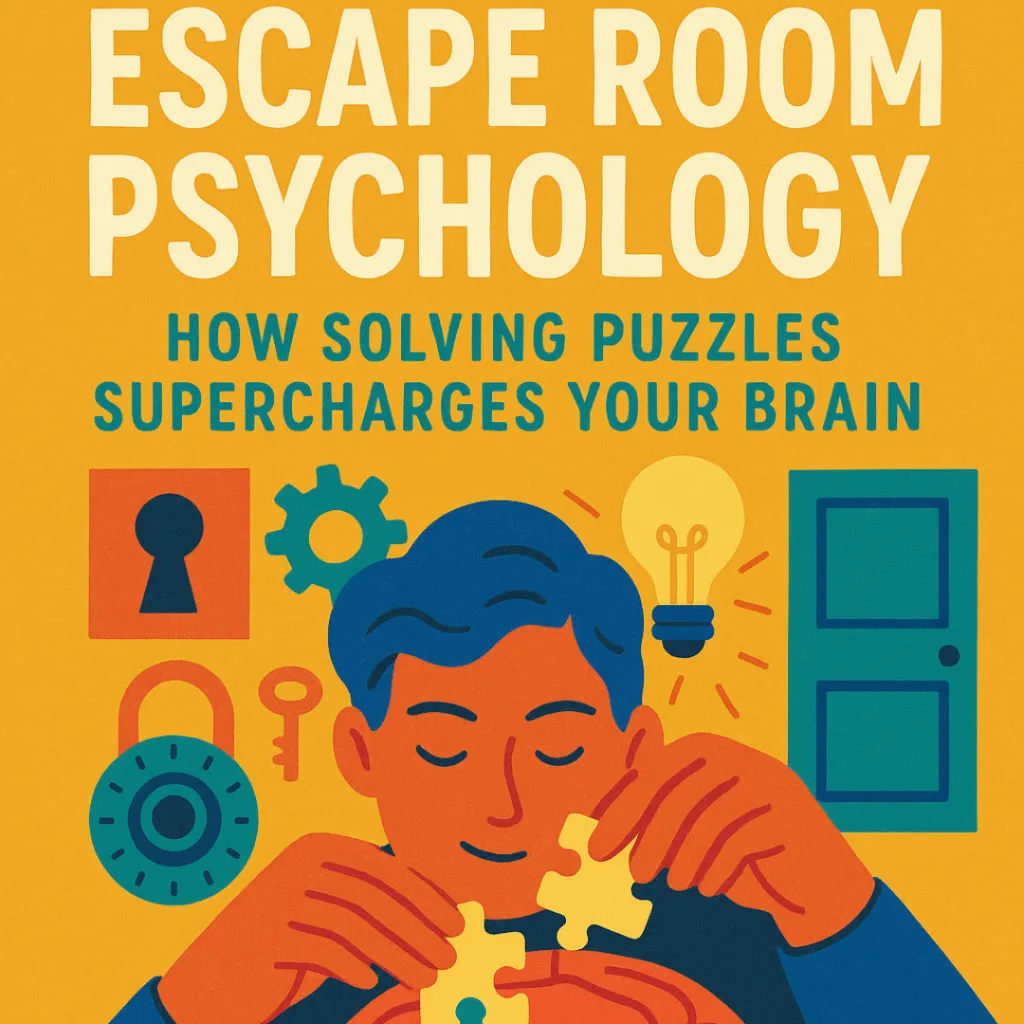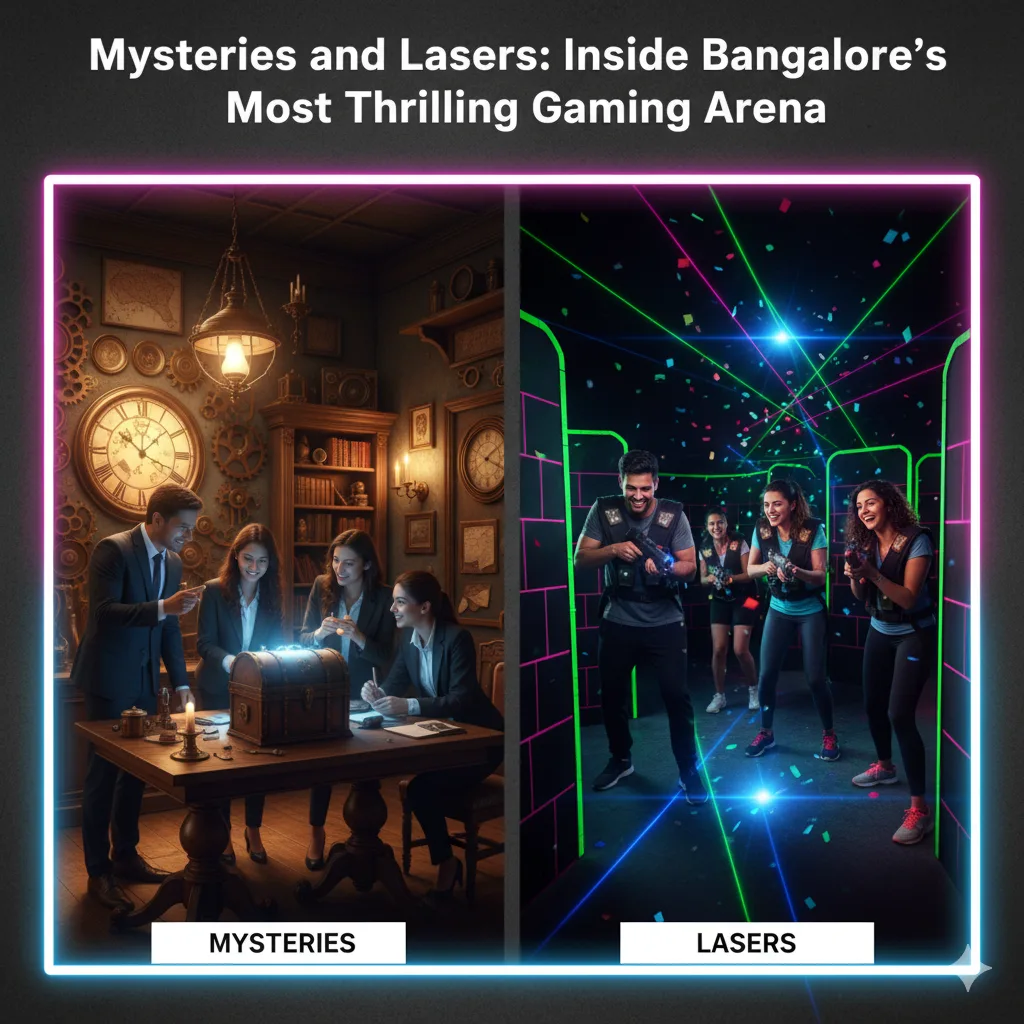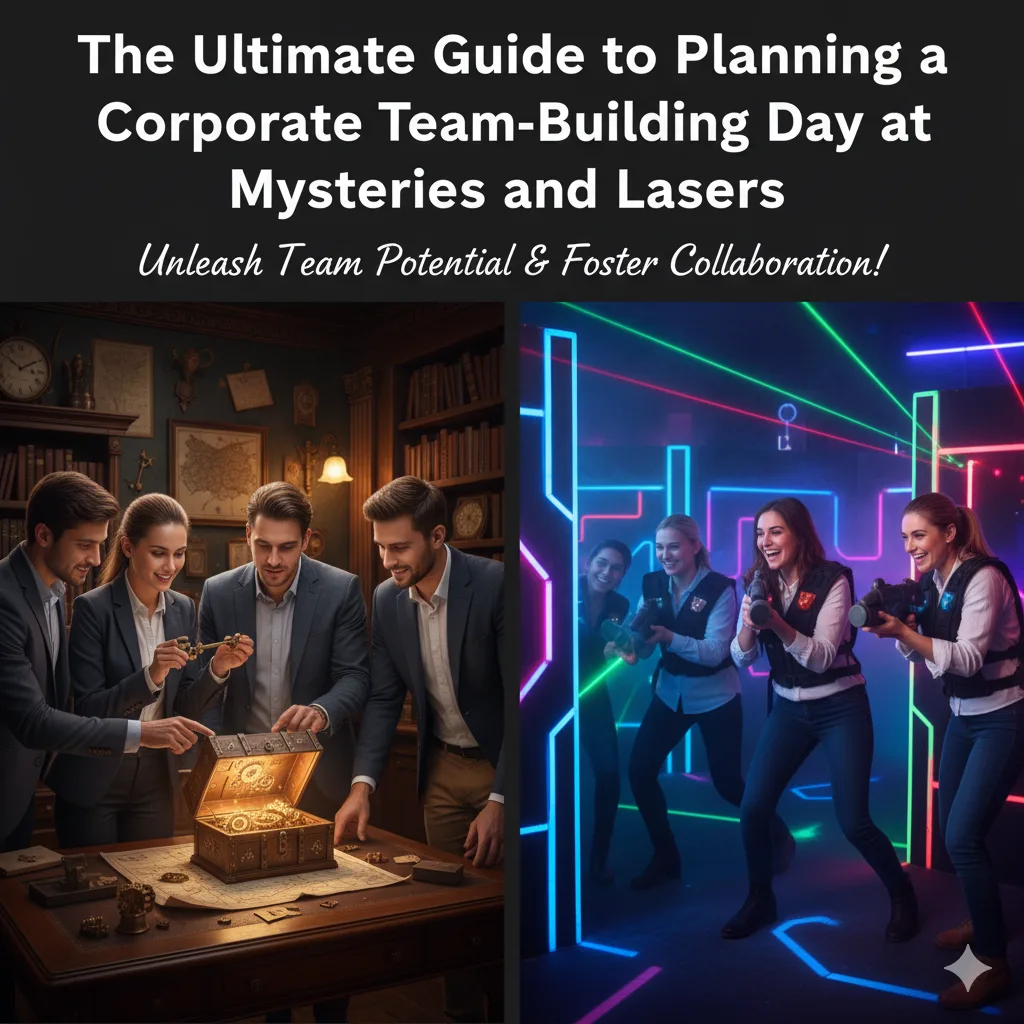Mysteries and Lasers: Inside Bangalore’s Most Thrilling Gaming Arena
How to Organize an Unforgettable Birthday or Team Celebration with Gaming Adventures Bangalore has always been a city that thrives...

Escape rooms are more than just thrilling games—they’re immersive, high-stakes playgrounds for your brain. Whether you’re racing to disarm a bomb, escaping a haunted mansion, or cracking codes in an ancient tomb, your brain is working overtime in ways that are not only fun—but incredibly beneficial. Escape room psychology is a fascinating area that blends game design, cognitive science, team dynamics, and behavioral psychology.
At Mysteries and Lasers, Bangalore’s leading immersive escape room destination, we’ve seen firsthand how our games light up the brain. Behind every lock, laser, and puzzle is a fascinating blend of cognitive science, psychology, and game design—all working together to supercharge your mental and emotional skills.
Let’s explore what’s really happening in your brain when you step into the world of escape rooms—and why it’s so good for you.
So why do escape rooms feel so good? And what exactly do they do to our brains? Let’s dive into the psychology and cognitive science behind these puzzle-packed adventures.
Every time you solve a puzzle or make progress in an escape room, your brain releases dopamine, the neurotransmitter responsible for pleasure, motivation, and reward.
This is the same reward system activated by video games, learning new skills, or achieving goals—except in escape rooms, it happens again and again, puzzle after puzzle.
Fun fact: The more unexpected the solution, the greater the dopamine surge. That’s why those “aha!” moments feel so satisfying.
Each room you enter presents a variety of challenges designed to push your cognitive abilities to the limit. Here’s what you’re working out:
Brain Skill | Escape Room Activity |
Logic & Deduction | Analyzing clues, eliminating red herrings |
Memory | Remembering sequences, patterns, or hints |
Focus & Attention | Zeroing in on relevant details under pressure |
Pattern Recognition | Spotting connections between symbols or objects |
Lateral Thinking | Using creative, non-linear problem-solving |
It’s one of the few recreational activities that fully engages both left and right hemispheres of the brain, blending analytical thinking with creativity.
When the answer finally clicks into place, it’s more than relief—it’s the “eureka effect.” Psychologists call this insight learning, and it’s an incredibly powerful emotional and cognitive experience.
These moments not only feel good, but they also strengthen neural pathways that improve long-term problem-solving skills.
Escape rooms are designed to trigger what psychologists call flow—a state of deep focus and immersion where time seems to disappear.
Psychologist Mihaly Csikszentmihalyi coined this term to describe a peak mental state of full immersion.
Flow happens when:
In flow, your brain operates at peak efficiency. It’s mentally refreshing and can even reduce stress.
Escape rooms are inherently collaborative, which activates areas of the brain associated with empathy, communication, and trust. Working with others on a shared goal satisfies our brain’s need for social connection—a core component of emotional well-being.
Social problem-solving is rare in modern life—but escape rooms give us a healthy space to practice it.
Regularly engaging in escape rooms or similar activities can have long-term cognitive benefits, including:
And because they’re novel and stimulating, escape rooms encourage neuroplasticity—the brain’s ability to rewire itself and form new connections.
Every time you:
…you’re strengthening your brain’s flexibility and resilience.
That’s why escape rooms aren’t just fun—they’re cognitively enriching experiences.
Escape rooms are social by nature. Whether you’re with friends, coworkers, or strangers, you’ll need to talk, collaborate, and navigate different perspectives to succeed.
This engages the brain’s social circuitry—including regions like the temporal lobes and anterior cingulate cortex—that help us:
In other words, escape rooms boost your social intelligence, especially under pressure. That’s why they’re so popular for team-building and leadership development.
Escape rooms challenge the brain with a variety of tasks that stimulate executive functions—the high-level cognitive processes we use to plan, solve problems, and think flexibly.
What’s activated:
Brain benefits:
Enhanced multitasking and decision-making
Escape rooms are social experiments disguised as entertainment. When you lock a group of people in a room with one shared goal, fascinating dynamics emerge.
Watch for:
Natural leaders – Someone often steps up to direct or delegate.
Role adoption – Some players take on “finder” roles, others focus on solving or observing.
Communication styles – Teams that talk openly and listen to each other tend to perform better.
Conflict resolution – Under time pressure, how does your team handle disagreement?
An escape room can show you exactly how a group functions—and how individuals behave under pressure.
While more research is needed, anecdotal evidence and early studies suggest escape rooms may support mental health by:
Some therapists are even exploring gamified therapy and cognitive rehab using escape-room-style puzzles.
Want to get the most cognitive bang for your buck next time you play? Try these:
Reflect afterward: Discuss what worked and what didn’t to improve future performance.
While you’re dodging lasers or cracking codes, your brain is:
✔️ Releasing dopamine
✔️ Strengthening memory
✔️ Improving focus
✔️ Encouraging teamwork
✔️ Building new neural pathways
✔️ And entering a powerful state of flow
The next time you step into an escape room, know this: you’re not just chasing clues—you’re boosting brainpower.
With every puzzle you solve and lock you open, you’re enhancing focus, communication, memory, and emotional regulation. It’s like brain training—wrapped in mystery and adventure.
Every time you step into an escape room at Mysteries and Lasers, you’re not just solving puzzles — you’re unlocking your brain’s full potential. Here’s how:
Solving diverse puzzles stimulates multiple areas of your brain, from logic to memory to spatial reasoning. You’re building neural connections, improving cognitive flexibility, and exercising your executive functions — just like a mental gym session, but way more fun.
🧩 Each challenge pushes your brain to think critically, adapt quickly, and find innovative solutions under pressure.
Escape rooms thrive on teamwork. To win, you must speak clearly, listen actively, and collaborate effectively — all in a high-pressure environment.
🗣️ This builds communication skills that go beyond the game room — into boardrooms, classrooms, and everyday conversations.
Working in a fast-paced, puzzle-packed environment with others teaches you to manage frustration, celebrate small wins, and empathize with teammates.
💬 You learn how to support, trust, and adapt to different personalities — strengthening your emotional resilience and interpersonal awareness.
That feeling when you’re completely in the zone, time disappears, and every decision feels instinctive? That’s flow — a state of deep mental engagement and joy.
🚀 Our rooms are designed to trigger that powerful “zone” where your mind is focused, your creativity is flowing, and your confidence soars.
Most importantly — you’re having genuine fun. You’re laughing with friends, high-fiving after a win, and sharing unforgettable moments in immersive story worlds.
🎉 At Mysteries and Lasers, learning and self-improvement don’t feel like work — they feel like adventure.
So next time you lock into one of our escape rooms, remember:
You’re not just playing a game.
You’re becoming sharper, stronger, and smarter — one clue at a time.
Whether you’re stepping into the Haunted Asylum, plotting your escape from Prison jailbreak, sailing through Caribbean Pirates, or diving into our VR Escape Missions, one thing’s certain—your brain will thank you.
So go ahead, get locked in. Your brain will thank you.
📍 Location: JP Nagar, Bangalore
🌐 Book Now: www.mysteriesandlasers.com
📞 Call or WhatsApp: +91 8296598498
🕒 Open Daily: 11:00 AM – 10:00 PM
Escape smarter. Play harder. Think deeper.
Mysteries and Lasers is where your brain goes to level up.
Tags : VR Escape Rooms, Traditional Escape Rooms, Escape Room Comparison, Virtual Reality Escape Room, Physical Escape Room, Escape Room Bangalore, Mysteries and Lasers, VR vs Physical Escape Rooms, Best Escape Rooms in Bangalore, Immersive Escape Games, Escape Room Tips, Team Building Activities, Family Friendly Activities Bangalore, Corporate Events Bangalore, Birthday Party Ideas Bangalore, Indoor Activities in Bangalore, Adventure Games Bangalore, Puzzle Solving Games, Group Activities Bangalore, Tech Experiences in Bangalore





How to Organize an Unforgettable Birthday or Team Celebration with Gaming Adventures Bangalore has always been a city that thrives...
How to Organize an Unforgettable Birthday or Team Celebration with Gaming Adventures Every birthday or office celebration marks more than...
Level Up Team Morale: The Psychology Behind Escape Room Success Every great team has one thing in common — trust,...
Why Escape Rooms Are the Perfect Weekend Plan for Friends and Families Weekends have evolved. Gone are the days when...
Why Escape Rooms Are the Perfect Weekend Plan for Friends and Families In the fast-evolving corporate world, success is no...
Why Escape Rooms Are the Perfect Weekend Plan for Friends and Families In today’s fast-paced corporate world, teamwork isn’t just...
Why Escape Rooms Are the Perfect Weekend Plan for Friends and Families Why Escape Rooms Are the Best Weekend Plan...
Top 7 Reasons to Host Your Next Corporate Event at an Escape Room Gone are the days of one-size-fits-all corporate...
Best Indoor Activities in Bangalore for Rainy Days Bangalore’s charm lies in its blend of vibrant culture, buzzing tech scene,...
Why September Is the Perfect Month to Plan a Team Challenge in Bangalore If you’re looking for fresh team building...
Behind the Scenes: How We Design an Escape Room at Mysteries & Lasers Escape rooms are more than games—they’re full-scale...
Where to Host a VR Gaming Party in Bangalore The way we celebrate has changed. Gone are the days when...
Top Adventure Spots in JP Nagar You Shouldn’t Miss When you think of adventure, your mind might wander to towering...
Planning a Surprise Party Inside an Escape Room? Here’s How! Throwing a surprise party has always been a timeless way...
Why Corporate Teams Love VR Adventures for Off-Sites Corporate off-sites are no longer about long meetings in sterile boardrooms or...
arkarisings Aug 01, 2025 General Queries What to Expect During Your First Escape Room Experience Escape rooms have exploded in...
arkarisings Jul 28, 2025 General Queries Tips to Beat an Escape Room Game Like a Pro Escape rooms are an...
arkarisings Jul 15, 2025 Escape Rooms Escape Room Themes Explained: Horror, Sci-Fi, Mystery & More Escape rooms are more than...
arkarisings June 30, 2025 Birthday Parties How to Plan a Unique Birthday Party at an Escape Room Planning the perfect...
arkarisings June 28, 2025 Birthday Parties VR Escape Rooms vs Traditional Escape Rooms: What’s Better for You? Are you ready...
arkarisings June 28, 2025 Birthday Parties Planning the Perfect Kids’ Birthday Party at Mysteries and Lasers Every parent wants to...
arkarisings June 28, 2025 Escape Rooms Unlocking Team Potential: The Ultimate Corporate Package at Mysteries and Lasers In today’s fast-paced...
arkarisings May 28, 2025 Escape Rooms Places to Visit Near JP Nagar and Koramangala: A Local's Guide to Fun, Food...
arkarisings Apr 9, 2025 Escape Rooms A Day of Thrills and Spills in Bangalore: Beyond Escape Rooms Bangalore, the vibrant...
arkarisings Apr 9, 2025 Escape Rooms Unlock the Fun: Escape Rooms and Celebration Packages at Mysteries and Laser, Bangalore (JP...
arkarisings Apr 9, 2025 Escape Rooms Unlock Thrills and Celebrate in Style: Overview of Mysteries and Lasers' Escape Rooms and...
arkarisings Apr 5, 2025 Escape Rooms Unlock Unforgettable Adventures: Your Ultimate Guide to Escape Rooms in Bangalore with Mysteries and...
arkarisings Dec 16, 2023 Fun Activities The Benefits Of Playing Laser Tag As A Team Building Activity With Your Employees...
Sanskar Dubey Jan 20, 2024 Fun Activities Thrill Seekers Unite: Mysteries and Lasers' VR & Laser Tag Gaming Zone in...
Kedareswar K Jul 31, 2024 Fun Activities 10 REASONS WHY AN ESCAPE ROOM IS THE BEST TEAM BUILDING ACTIVITY Build...
Copyright © Mysteries and Lasers 2025. All Right Reserved.